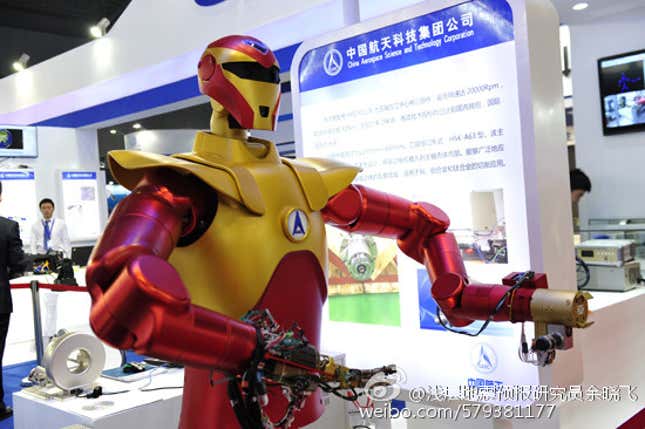Have you ever imagined Iron Man landing on the Red Planet? Well of course you have. And it’s likely that many visitors to this week’s China International Industry Fair in Shanghai will too.
On Nov. 3 China’s space agency unveiled a model of its home grown Mars probe, which includes an orbiter and a landing rover and is scheduled to launch in 2020. Also unveiled at the fair was a brand-new space robot that looks strikingly similar to Iron Man, the Marvel superhero played by Robert Downey, Jr., in the internationally successful movie series.

According to the state news agency Xinhua (link in Chinese), the robot is called Xiaotian, which translates into “little sky.” Developed by state-owned China Aerospace Science and Technology Corp., the nation’s main space contractor, Xiaotian is described as a new type of robot that can “cope with the harsh space environment and complex manipulation tasks.” It can work in wide variety of environments, apparently, from space stations to lunar landings to unmanned space probes.
The news site Guancha gives more details (link in Chinese). It reports the robot has flexible arms and hands that enable it to do anything human hands can do, from picking up a pen to replacing an electrical connector. And unlike typical industrial robots, it adds, Xiaotian can work in outer space.
Xiaotian won’t be joining the Mars mission—and it’s difficult to ascertain how effective it might actually be as a space robot—but its presence accompanied by the probe replica surely lit up imaginations at the fair.
While the goals of the unmanned Mars mission don’t include Tony Stark, they do include comprehensive remote sensing and a landing on the surface, said Niu Shengda, a satellite scientist with the Shanghai Academy of Spaceflight Technology, in a Xinhua article (link in Chinese).
The news comes after NASA claimed to have discovered liquid on Mars in September. China’s sole attempt at reaching Mars in 2011 failed to leave Earth’s orbit.




